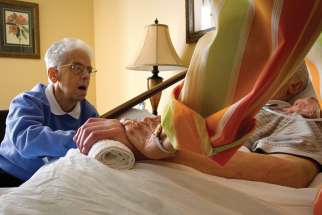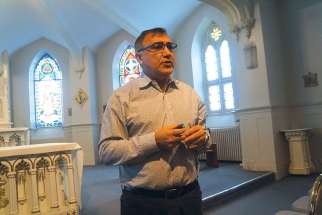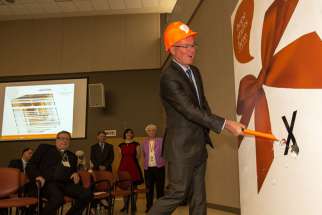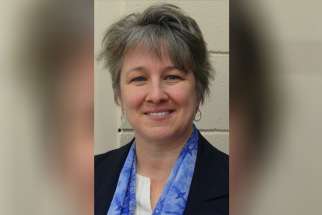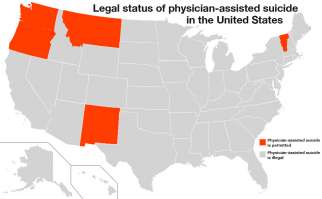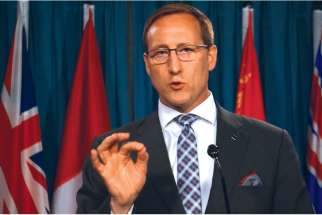Comment: Rediscovering the art of dying
In the 16 months between the Supreme Court decision and the passage of federal legislation regulating medically assisted death, I was intensely involved in discussions and debates within the medical profession, among Catholic health care providers, ethicists and clergy, and with national and provincial government bodies. I was trying to mitigate the harms of the decision, particularly in the protection of the vulnerable, and in defending the right of conscientious objection for physicians and faith-based organizations.
Palliative care is about living, not dying, says expert
OTTAWA – Palliative care is about living and celebrating life and should begin much earlier than a during a patient’s last days and weeks of life, palliative care physician Dr. Jose Pereira said Feb. 18.
Book Review: Consecrated life isn’t dying, just changing
In the dying process, our souls mature
In her deeply insightful book The Grace of Dying, Kathleen Dowling Singh shares insights she has gleaned as a health professional from being present to hundreds of people while they are dying. Among other things, she suggests that the dying process itself “is exquisitely calibrated to automatically produce union with Spirit.”
California governor faces final call on right-to-die bill
California Gov. Jerry Brown has until midnight Oct. 7 to sign or veto a controversial bill that would legalize physician-assisted dying in the United States’ most populous state.
Providence reimagines palliative care
TORONTO - If death is a part of life then we shouldn’t die alone any more than we should live in isolation. Our deaths should not be coldly institutionalized any more so than our lives. Our deaths should be as surrounded by family, love and compassion as the lives we lived.
St. John Paul II, a pope who gave himself to the end
I once found myself in a room full of photographers forced to make a passionate defence of the Pope. It was an odd sort of defence. I was defending the Pope’s right to look frail, weak, lost and vulnerable in public.
EDMONTON - Jo-Anne Paquette’s three-month journey with Martha Shephard as she died from a brain tumour was both physically draining and a spiritual gift for Paquette.
A number of voices have called on the federal government to trump the Supreme Court’s assisted-suicide decision with the notwithstanding clause — the controversial section 33 of the Charter of Rights and Freedoms which allows Parliament to pass laws contravening some rights and liberties for up to five years before legislators have to re-vote on the matter or craft new legislation.
ALBANY, N.Y. - As New York lawmakers began to consider a bill to legalize physician-assisted suicide, the New York State Catholic Conference launched a new website "to offer Catholics moral clarity and guidance on the church's teachings regarding end-of-life decision-making."
Now's the time
In the 33-year life of the Charter of Rights and Freedom the federal government has never invoked the notwithstanding clause to override a court ruling. But Canada has never faced a decision quite like the Feb. 6 edict by the Supreme Court that will usher in assisted suicide and euthanasia.
Speculation mounts on response to euthanasia decision
OTTAWA - With one year to come up with a solution after the Supreme Court struck down Canada’s laws against physician-assisted suicide, there are any number of options being bandied about on all spectrums of the political divide.
The next Belgium
And so it begins. The Supreme Court of Canada decision to legalize assisted suicide (and by extension euthanasia) is chilling but no surprise. Poll after poll has shown Canadian public sympathy moving steadily in favour of some form of state-sanctioned killing.
Opponents rally in wake of Supreme Court decision on assisted suicide
OTTAWA - Disappointment, indignation and calls to invoke the notwithstanding clause followed a historic Supreme Court of Canada unanimous decision that struck down a ban on physician-assisted suicide and opened the door to assisted death for people who may not have a terminal illness.
Doctors need to encourage patients’ end-of-life planning
Doctors may be men and women of action, but before a patient dies they should be open and available for lots of talk, the College of Physicians and Surgeons of Ontario is advising its members.

